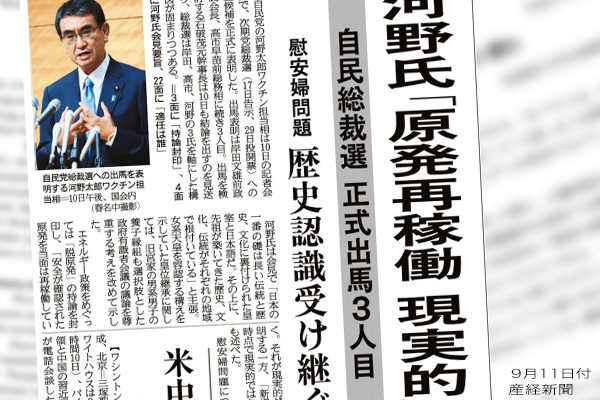“I would restart and use nuclear power plants that can be used after confirming their safety,” Taro Kono told a news conference on September 10 when he announced his candidacy for the ruling Liberal Democratic Party’s presidential election. On the remark, major Japanese newspapers reported that Kono sealed off his nuclear phaseout policy. The report is wrong. Kono has not sealed off his policy of phasing out nuclear plants.
Insisting on canceling nuclear fuel reprocessing
In the Yomiuri TV program “Wake Up” in the morning of September 11, Kono said: “The service life for Japan’s current light water nuclear reactors is 40 years and could be extended to 60 years. I would use those of which safety has been confirmed.” This remark was interpreted again as indicating he has sealed off the nuclear phaseout policy. At the same time, however, Kono said, “I would cancel the launching of a nuclear fuel reprocessing facility that is no longer necessary.” Discussing the reason for the cancellation, he said: “As a decision has been made to decommission the Monju fast breeder reactor (for using plutonium as fuel), Japan does not have to reprocess spent nuclear fuel to extract plutonium. The reprocessing should be canceled. We should discuss how to dispose nuclear waste.”
This explanation represents traditional arguments of Kono, anti-nuclear organizations, the Constitutional Democratic Party of Japan and other opposition parties. If the reprocessing facility in Aomori Prefecture’s Rokkasho Village is unable to reprocess spent fuel stored at nuclear power plants in Japan, spent fuel pools in the plants would be filled up, forcing these plants to be shut down with fuel replacement made impossible.
This is the very strategy of anti-nuclear groups. The strategy is written in Kono’s new book titled “Move Japan Forward,” published by PHP Institute ahead of the LDP presidential election. A prime minister is empowered to “accomplish various things if willing to do so,” he says in the book.
Inseparable from anti-nuclear groups
Kono, along with members of anti-nuclear groups and opposition political parties, attended an international conference in Tokyo in February 2017 on the Japan-U.S. nuclear energy agreement and Japan’s plutonium policy. Participants adopted a declaration calling for blocking the automatic extension of the Japan-U.S. nuclear energy agreement, the launching of the Rokkasho reprocessing facility and nuclear power plant operations.
In September 2017, a delegation of anti-nuclear groups visited the United States and made a claim that Japan’s plutonium accumulation became a matter of international concern. Japan Broadcasting Corp. known as NHK reported this event in the “Close-Up Gendai Plus” program under the title “Globally growing concern about Japan as a plutonium power” on October 30, 2017. Taking advantage of influential Americans’ remarks to press the Japanese government is called a “Washington loudspeaker.” It is exactly what the NHK program did to exert pressure on the then Shinzo Abe administration.
Then Foreign Minister Kono voluntarily told the International Atomic Energy Agency that Japan would reduce plutonium, while the IAEA never asked Japan to do so. This represented a second Kono statement comparable to the original Kono statement issued by his father Yohei Kono as chief cabinet secretary in 1993 on the wartime comfort women issue that caused a stir.
The September 9 issue of the Weekly Bunshun magazine reported that Taro Kono was intimidating officials of the Agency for Natural Resources and Energy into raising renewable energy’s share of Japan’s target power mix. If Kono becomes prime minister, he might allow anti-nuclear groups to hijack the LDP’s nerve center and might intimidate cabinet ministers and bureaucrats raising opposition to him.
Tadashi Narabayashi is a specially appointed professor at the Tokyo Institute of Technology and a director at the Japan Institute for National Fundamentals.


